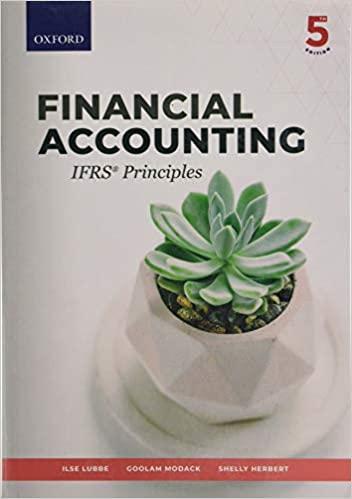Question
Flandro Company uses a standard cost system and sets its predetermined overhead rate on the basis of direct labor-hours. The following data are taken from
Flandro Company uses a standard cost system and sets its predetermined overhead rate on the basis of direct labor-hours. The following data are taken from the companys planning budget for the current year: Denominator activity (direct labor-hours) 19,000 Variable manufacturing overhead cost $ 62,700 Fixed manufacturing overhead cost $ 147,250 The standard cost card for the companys only product is given below: Inputs (1) Standard Quantity or Hours (2) Standard Price or Rate Standard Cost (1) (2) Direct materials 4 yards $ 2.10 per yard $ 8.40 Direct labor 2 hours $ 8.50 per hour 17.00 Manufacturing overhead 2 hours $ 11.05 per hour 22.10 Total standard cost per unit $ 47.50 During the year, the company produced 9,880 units of product and incurred the following actual results: Materials purchased, 62,700 yards at $2.00 per yard $ 125,400 Materials used in production (in yards) 40,750 Direct labor cost incurred, 20,000 hours at $8.10 per hour $ 162,000 Variable manufacturing overhead cost incurred $ 61,800 Fixed manufacturing overhead cost incurred $ 128,000 Required: 1. Create a new standard cost card that separates the variable manufacturing overhead per unit and the fixed manufacturing overhead per unit. 2. Compute the materials price and quantity variances. Also, compute the labor rate and efficiency variances. 3. Compute the variable overhead rate and efficiency variances. Also, compute the fixed overhead budget and volume variances.
Compute the materials price and quantity variances. Also, compute the labor rate and efficiency variances. (Indicate the effect of each variance by selecting "F" for favorable, "U" for unfavorable, and "None" for no effect (i.e., zero variance.). Input all amounts as positive values.)
Compute the variable overhead rate and efficiency variances. Also, compute the fixed overhead budget and volume variances. (Indicate the effect of each variance by selecting "F" for favorable, "U" for unfavorable, and "None" for no effect (i.e., zero variance.). Input all amounts as positive values.)
Step by Step Solution
There are 3 Steps involved in it
Step: 1

Get Instant Access to Expert-Tailored Solutions
See step-by-step solutions with expert insights and AI powered tools for academic success
Step: 2

Step: 3

Ace Your Homework with AI
Get the answers you need in no time with our AI-driven, step-by-step assistance
Get Started


